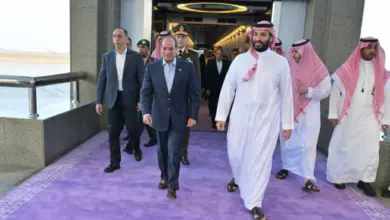Along with fasting during the day, the other main feature of Ramadan is the peak television and talk show season in Egypt.
During the first Ramadan since the revolution, though, many Egyptians have been surprised by the return of media personalities associated with the regime of former President Hosni Mubarak regime as regulars on the talk show circuit, especially after they had previously been singled out for playing counter-revolutionary roles.
After long days of fasting and working, many Egyptians tend to break their fasts by sitting around their televisions and taking part in the media’s annual talk show explosion. They expect gimmicky, new talk shows with fresh hosts, constantly adding new “twists” to make them unique or marketable. Television shows were, in fact, quick to make the revolution a theme, yet the twist this time seems to be adding many personas non grata to these shows.
“What has been happening lately is an attempt by these people to go through a purification period, where they are trying to win back trust or find a way to ease their way back into public life,” said Safwat al-Alim, a political media professor at Cairo University.
Many of these individuals have appeared more than once on different channels in a span of less than two weeks, following a six-month hiatus of seeing them on television regularly.
Osama Saraya, former editor-in-chief of Egypt’s flagship newspaper Al-Ahram, has appeared on many talk shows recently, defending the role his paper played in the early days the revolution.
On shows such as Reham Saeed’s “A Break on Air,” Saraya defended his personal affinity for Mubarak and insisted that he never departed from journalistic ethics, even in Al-Ahram's infamous Photoshop incident last September.
Saraya defended his newspaper's digital alteration of Mubarak’s picture at a US summit, in which he was falsely depicted as walking ahead of other world leaders. Saraya maintained that the photo was manipulated due to a desire to produce an “expressive photo" that alluded to Egypt’s leadership role in the region.
In another talk show, media presenter and journalist Wael al-Ibrashy described the role of the state media during the revolution as treacherous, while hosting Tamer Amin, a once prime-time presenter on Egypt’s state television. Talk show hosts have charged Amin with only supporting the revolution once it became abundantly clear that the Mubarak government was on its way out. Since the beginning of Ramadan, Amin has been one of the most widely interviewed public figures.
Analysts believe that Ramadan came at an opportune time for many of these figures. Besides being able to benefit from the high viewership, they have also been aided by the time that has elapsed since Mubarak’s ouster.
“Everyone is watching in Ramadan. Also, the Egyptian public is sometimes able to forget quickly what ills a person has committed,” Alim said.
While proponents of the Mubarak regime often appear on Ramadan television shows, audiences may be satisfied with the level of criticism to which they are subject.
Every Ramadan, Lebanese host Tony Khalifa digs into the private lives of celebrities; his show turned highly political this year as he renamed it, “The People Want,” an allusion to the Arab Spring’s main street slogan: “The people want to bring down the regime.”
This year, Khalifa hosted a group of celebrities known to be close to the toppled regime. In one of the episodes, actor Talaat Zakaria burst into tears as he remembered that his beloved, deposed president was facing charges in prison. Zakaria, who had taken part in a film portraying the toppled president in a positive fashion, had said on television that the revolutionaries of Tahrir Square were a clique of delinquents who had sex in the middle of the square.
Many believe that prominent television presenter Yosri Fouda’s decision to host former National Democratic Party (NDP) stalwart Hossam Badrawy was ill-timed.
“If you insisted on inviting him on the show, you should have been harsher with your questions,” said media expert Yasser Abdel Aziz in a phone call that aired on the show.
The talk shows seem to be attempting to get counter-revolutionary figures or prominent proponents of the Mubarak regime to open up by using different gimmicks. In Saeed’s show, the guest is filmed during the commercial breaks, and his or her comments are aired after gaining consent.
“This is to show people that you are not a hypocrite and will say the same things on air that you would off,” she always tells her guests.
For some, such as recording artist Amr Mostafa, this recording has only served to dampen his public image, as he revealed to Egyptians his conspiracy theories, including saying that Coca-Cola played a subversive role in the revolution and trying to convince the public that some of the Arabic chants during the demonstrations were actually in Hebrew.
“Many of them are putting themselves in contradictions that are raising more questions about their character rather improving their public image, as intended,” said Alim.
Former NDP member Ahmed Shobeir admitted that he cheated in the November 2010 elections on Magdy al-Galad’s talk show, “You and Your Conscience.”
Bizarrely, Shobeir said that he had personally rigged voting boxes to show that he should not have lost. The 2010 parliamentary elections, in which the NDP took a sweeping majority of seats, was highly condemned by activists for the high level of fraud involved. Some look to it as one of the elements that spurred the eruption of the revolution.
In his talk show, Galad tries to confront his guests by asking questions from a voice that is supposed to be their conscience; however, for the most part guests look back at Galad dumbfounded.
“That’s your conscience, not mine!” Tamer Amin, another prominent talk show guest, once told him on the show.
While there has not been a notable popular backlash to these talk shows, they have not been very popular with the more staunch revolutionaries.
“While many Muslims abstain from sin during the month of Ramadan, television is making us forget all of that, by putting these faces on television,” said Bassem Hassan, a member of the April 6 Youth Movement.
In the meantime, the reappearance of many of these figures on television has raised many eyebrows concerning the role of the media in post-revolutionary Egypt.
“The media is playing an unobjective role by putting these people on air. Many of these people have friends that either produce or host these shows and are able to convince them to go on them to help airbrush their image,” said Alim.




